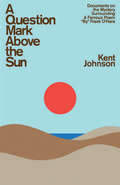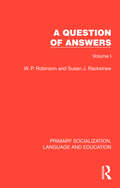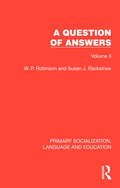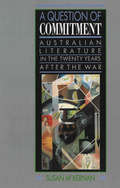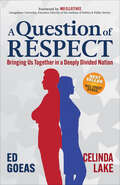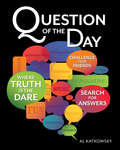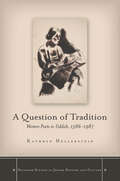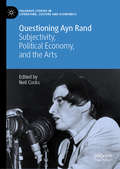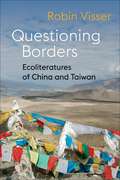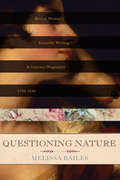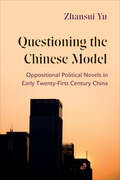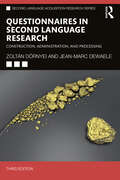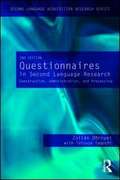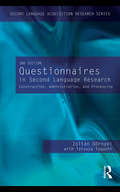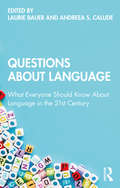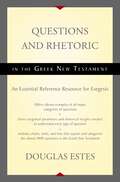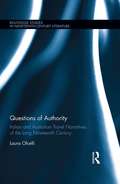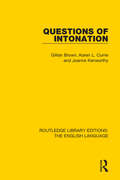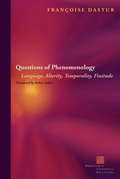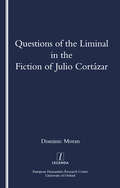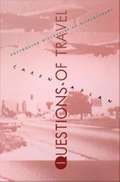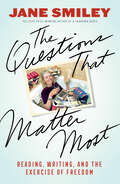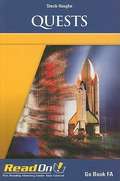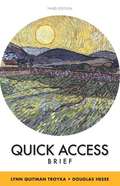- Table View
- List View
A Question Mark Above the Sun
by Eric Lorberer Kent Johnson David Koepsell"At the end of last year, an extraordinary work of detective criticism briefly appeared, despite legal threats. Kent Johnson's A Question Mark Above the Sun (Punch Press) movingly speculates that Kenneth Koch forged one of Frank O'Hara's greatest poems as a posthumous tribute to his friend. A noir-ish middle also recounts some very funny run-ins with the English avant-garde. Shame on the poets who forced its redaction and suppression." - Jeremy Noel-Tod, The Times Literary Supplement, including a previous edition of A Question Mark Above the Sun as one of its 2011 Books of the YearWhat you have in your hands is a kind of thought-experiment. It proffers the idea that a radical, secret gesture of poetic mourning and love was carried out by Kenneth Koch in memory of his close friend Frank O'Hara. I present the hypothesis as my own very personal expression of homage for the two great poets. The proposal I set forward here, nevertheless, is likely to make some readers annoyed, perhaps even indignant. Some already are. A few fellow writers, even, have worked hard through legal courses to block this book's publication. The forced redaction of key quotations herein (replaced by paraphrase) is one result of their efforts.In this self-described "thought experiment"-part fiction, part literary detective work, and always daring-Kent Johnson proposes a stunning rewrite of literary history. Suppressed upon initial release, this is a one-of-a-kind book by one of our most provocative contemporary authors.Kent Johnson is the author, translator, or editor of over thirty books of poetry and criticism, including Beneath a Single Moon: Buddhism in Contemporary American Poetry (Shambhala Publications, 1991), Doubled Flowering: From the Notebooks of Araki Yasusada (Roof Books, 1998), and his most recent collection of poems, Homage to the Last Avante-Garde (Shearsman Books, 2008). Best known for his radical ideas about authorship, scholarship, and experimentation, it was with his translations of Hiroshima survivor poet Araki Yasusada that Johnson became both celebrated and castigated. Only after Yasusada's poems were published in American Poetry Review did readers learn there was no Yasusada, and that Johnson was not a translator on this project, but the author. Johnson is the recipient of a National Endowment for the Arts Literature Fellowship in Translation. He lives in Illinois, where he is a faculty member in English and Spanish at Highland Community College.
A Question of Answers: Volume I (Primary Socialization, Language and Education)
by W. P. Robinson Susan J. RackstrawIn the early 1970s, the problem of arousing and maintaining the curiosity of children had been a recurrent theme in reports concerned with the development of new school curricula. However, before these ideas could be translated into soundly based practical measures, an increased understanding of what is involved in the activities of questioning and answering was needed.Originally published in 1972, the research reported in these two volumes presents a theoretical framework for describing linguistic features of a range of verbally expressed answers and their associated questions. Basil Bernstein’s theory is used to generate a number of predictions about the variety and quality of answers that mothers and children are likely to offer to ‘wh’ questions. The usefulness of the scheme is tested against the answering behaviour of members of different social classes, and, in the main, Bernstein’s predictions are supported. The validity of the categories in the classificatory scheme is explored more fully in later chapters by means of a correlational analysis of the answers of seven-year-old children.Volumes sold separately.
A Question of Answers: Volume II (Primary Socialization, Language and Education)
by W. P. Robinson Susan J. RackstrawIn the early 1970s, the problem of arousing and maintaining the curiosity of children had been a recurrent theme in reports concerned with the development of new school curricula. However, before these ideas could be translated into soundly based practical measures, an increased understanding of what is involved in the activities of questioning and answering was needed.Originally published in 1972, the research reported in these two volumes presents a theoretical framework for describing linguistic features of a range of verbally expressed answers and their associated questions. Basil Bernstein’s theory is used to generate a number of predictions about the variety and quality of answers that mothers and children are likely to offer to ‘wh’ questions. The usefulness of the scheme is tested against the answering behaviour of members of different social classes, and, in the main, Bernstein’s predictions are supported. The validity of the categories in the classificatory scheme is explored more fully in later chapters by means of a correlational analysis of the answers of seven-year-old children.Volumes sold separately.
A Question of Commitment: Australian literature in the twenty years after the war
by Susan LeverIn the years since the Second World War, Australia has seen a period of literary creativity which outshines any earlier period in the nation's literary history. This creativity has its beginnings in the arguments and alignments which emerged at the end of the War, and the changes in perceptions of art and society which occurred during the fifties and early sixties.A Question of Commitment examines the attitudes of writers as diverse as James McAuley, Frank Hardy, Judith Wright, Patrick White and A. D. Hope, as they responded to a changing Australian society during the postwar years. Through their work and that of many others, it considers the debates about literary nationalism, the artistic politics of the Cold War, the threat of technology to art in the Atomic Age, and the nature of the writer's role in the new society. It documents the way in which the political commitments of some writers and the resistance to commitment of others were challenged by political and social changes of the late fifties.Susan McKernan's lively exploration of Australia's writers in a time of innovation provides the reader with the context needed to understand the creative choices they made and, in so doing, introduces wider intellectual and cultural issues which remain relevant to this day.
A Question of RESPECT: Bringing Us Together in a Deeply Divided Nation
by Ed Goeas Celinda LakeA Question of Respect speaks to voters who are tired of a political environment that ends in immovable stalemate, grounded by a political party’s voter base without addressing solutions or attempting to understand the opposing side.
Question of the Day: Where Truth is the Dare
by Al KatkowskyPerfect for spending time with friends, family or even co-workers, Question of the Day is designed to help people explore a variety of topics that challenge them to think, be brutally honest, and form perhaps previously unstated opinions. Using these questions is fun, enlightening, surprising and revealing'ideal as an ice breaker among willing acquaintances or as a source of deeper conversation among old friends. It's fun, but also challenging and the subtitle is meant to reflect that. Questions are ranked on a scale from 'light' to 'heavy' indicating the introspection, honesty, and even deep thinking required by the individuals the question is posed to. The questions can incite funny answers, embarrassment'even an unwillingness to answer. But every reaction to a question reveals to the group insights into the beliefs of the people answering. "Question of the Dayreads and plays like a game. The result is a much more stimulating version of The Book of Questions. ' -- Glenn Taverna, general manager, Border Books and Music Westbury, NY
A Question of Tradition: Women Poets in Yiddish, 1586-1987
by Kathryn HellersteinIn A Question of Tradition, Kathryn Hellerstein explores the roles that women poets played in forming a modern Yiddish literary tradition. Women who wrote in Yiddish go largely unrecognized outside a rapidly diminishing Yiddish readership. Even in the heyday of Yiddish literature, they were regarded as marginal. But for over four centuries, women wrote and published Yiddish poems that addressed the crises of Jewish history#151;from the plague to the Holocaust#151;as well as the challenges and pleasures of daily life: prayer, art, friendship, nature, family, and love. Through close readings and translations of poems of eighteen writers, Hellerstein argues for a new perspective on a tradition of women Yiddish poets. Framed by a consideration of Ezra Korman's 1928 anthology of women poets, Hellerstein develops a discussion of poetry that extends from the sixteenth century through the twentieth, from early modern Prague and Krakow to high modernist Warsaw, New York, and California. The poems range from early conventional devotions, such as a printer's preface and verse prayers, to experimental, transgressive lyrics that confront a modern ambivalence toward Judaism. In an integrated study of literary and cultural history, Hellerstein shows the immensely important contribution made by women poets to Jewish literary tradition.
Questioning Ayn Rand: Subjectivity, Political Economy, and the Arts (Palgrave Studies in Literature, Culture and Economics)
by Neil CocksQuestioning Ayn Rand: Subjectivity, Political Economy, and the Arts offers a sustained academic critique of Ayn Rand’s works and her wider Objectivist philosophy. While Rand’s texts are often dismissed out of hand by those hostile to the ideology promoted within them, these essays argue instead that they need to be taken seriously and analysed in detail. Rand’s influential worldview does not tolerate uncertainty, relying as it does upon a notion of truth untroubled by doubt. In contrast, the contributors to this volume argue that any progressive response to Rand should resist the dubious comforts of a position of ethical or aesthetic purity, even as they challenge the reductive individualistic ideology promoted within her writing. Drawing on a range of sources and approaches from Psychoanalysis to The Gold Standard and from Hannah Arendt to Spiderman, these essays consider Rand’s works in the context of wider political, economic, and philosophical debates.
Questioning Borders: Ecoliteratures of China and Taiwan (Global Chinese Culture)
by Robin VisserIndigenous knowledge of local ecosystems often challenges settler-colonial cosmologies that naturalize resource extraction and the relocation of nomadic, hunting, foraging, or fishing peoples. Questioning Borders explores recent ecoliterature by Han and non-Han Indigenous writers of China and Taiwan, analyzing relations among humans, animals, ecosystems, and the cosmos in search of alternative possibilities for creativity and consciousness.Informed by extensive field research, Robin Visser compares literary works by Bai, Bunun, Kazakh, Mongol, Tao, Tibetan, Uyghur, Wa, Yi, and Han Chinese writers set in Xinjiang, Tibet, Inner Mongolia, Southwest China, and Taiwan, sites of extensive development, migration, and climate change impacts. Visser contrasts the dominant Han Chinese cosmology of center and periphery that informs what she calls “Beijing Westerns” with Indigenous and hybridized ways of relating to the world that challenge borders, binaries, and hierarchies.By centering Indigenous cosmologies, this book aims to decolonize approaches to ecocriticism, comparative literature, and Chinese and Sinophone studies as well as to inspire new modes of sustainable flourishing in the Anthropocene.
Questioning Nature: British Women's Scientific Writing and Literary Originality, 1750-1830
by Melissa BailesIn the mid-eighteenth century, many British authors and literary critics anxiously claimed that poetry was in crisis. These writers complained that modern poets plagiarized classical authors as well as one another, asserted that no new subjects for verse remained, and feared poetry's complete exhaustion. Questioning Nature explores how major women writers of the era—including Mary Shelley, Anna Barbauld, and Charlotte Smith—turned in response to developing disciplines of natural history such as botany, zoology, and geology. Recognizing the sociological implications of inquiries in the natural sciences, these authors renovated notions of originality through natural history while engaging with questions of the day. Classifications, hierarchies, and definitions inherent in natural history were appropriated into discussions of gender, race, and nation. Further, their concerns with authorship, authority, and novelty led them to experiment with textual hybridities and collaborative modes of originality that competed with conventional ideas of solitary genius.Exploring these authors and their work, Questioning Nature explains how these women writers' imaginative scientific writing unveiled a new genealogy for Romantic originality, both shaping the literary canon and ultimately leading to their exclusion from it.
Questioning the Chinese Model: Oppositional Political Novels in Early Twenty-First Century China
by Zhansui YuIn the early twenty-first century, the Chinese literary world saw an emergence of fictional works – dubbed as "oppositional political novels" – that took political articulation as their major purpose and questioned the fundamental principles and intrinsic logic of the Chinese model. Based on close readings of five representative oppositional Chinese political novels, Questioning the Chinese Model examines the sociopolitical connotations and epistemological values of these novels in the broad context of modern Chinese intellectual history and contemporary Chinese politics and society. Zhansui Yu provides a sketch of the social, political, and intellectual landscape of present-day China. He investigates the dialectic relationship between the arts and politics in the Chinese context, the mechanisms and dynamics of censorship in the age of the Internet and commercialization, and the ideological limitations of oppositional Chinese political novels. In the process of textual and social analysis, Yu extensively cites Western political philosophers, such as Hannah Arendt, Antonio Gramsci, Michel Foucault, and references well-regarded studies on Chinese literature, politics, society, and the Chinese intelligentsia. Examining oppositional Chinese political novels from multiple perspectives, Questioning the Chinese Model applies a broad range of knowledge beyond merely the literary field.
Questionnaires in Second Language Research: Construction, Administration, and Processing (Second Language Acquisition Research Series)
by Zoltán Dörnyei Jean-Marc DewaeleQuestionnaires in Second Language Research is the first state-of-the-art methodological guide for producing and using questionnaires as reliable and valid research instruments in second language studies. Zoltán Dörnyei and Jean-Marc Dewaele provide a comprehensive, reader-friendly overview of the theory of questionnaire design, administration, and processing, made accessible with a detailed how-to guide and concrete, real-life applications. This new edition is thoroughly updated to reflect developments in the field and with recent example studies that focus on considerations, challenges, and opportunities raised at all stages of the research process by online questionnaires. There is also expanded, detailed guidance on how to use the IRIS database and how to clean, process, and analyze questionnaire data prior to determining and reporting findings. This is an invaluable resource to students and researchers of SLA, applied linguistics, psychology, and education who are interested in understanding and conducting quantitative L2 research using questionnaires and surveys.
Questionnaires in Second Language Research: Construction, Administration, and Processing
by Zoltan Dornyei Tatsuya TaguchiQuestionnaires in Second Language Research: Construction, Administration, and Processing is the first guide in the second language field devoted to the question of how to produce and use questionnaires as reliable and valid research instruments. It offers a thorough overview of the theory of questionnaire design, administration, and processing, made accessible by concrete, real-life second language research applications. This Second Edition features a new chapter on how an actual scientific instrument was developed using the theoretical guidelines in the book, and new sections on translating questionnaires and collecting survey data on the Internet. Researchers and students in second language studies, applied linguistics, and TESOL programs will find this book invaluable, and it can also be used as a textbook for courses in quantitative research methodology and survey research in linguistics, psychology, and education departments.
Questionnaires in Second Language Research: Construction, Administration, and Processing (2nd Edition)
by Tatsuya Taguchi Zoltán DörnyeiQuestionnaires in Second Language Research: Construction, Administration, and Processing is the first guide in the second language field devoted to the question of how to produce and use questionnaires as reliable and valid research instruments. It offers a thorough overview of the theory of questionnaire design, administration, and processing, made accessible by concrete, real-life second language research applications. This Second Edition features a new chapter on how an actual scientific instrument was developed using the theoretical guidelines in the book, and new sections on translating questionnaires and collecting survey data on the Internet. Researchers and students in second language studies, applied linguistics, and TESOL programs will find this book invaluable, and it can also be used as a textbook for courses in quantitative research methodology and survey research in linguistics, psychology, and education departments.
Questions
by Jan P. de RuiterThe view that questions are 'requests for missing information' is too simple when language use is considered. Formally, utterances are questions when they are syntactically marked as such, or by prosodic marking. Functionally, questions request that certain information is made available in the next conversational turn. But functional and formal questionhood are independent: what is formally a question can be functionally something else, for instance, a statement, a complaint or a request. Conversely, what is functionally a question is often expressed as a statement. Also, verbal signals such as eye-gaze, head-nods or even practical actions can serve information-seeking functions that are very similar to the function of linguistic questions. With original cross-cultural and multidisciplinary contributions from linguists, anthropologists, psychologists and conversation analysts, this book asks what questions do and how a question can shape the answer it evokes.
Questions About Language: What Everyone Should Know About Language in the 21st Century
by Laurie Bauer Andreea S. CaludeQuestions About Language sets out to answer, in a readable yet insightful format, a series of vital questions about language, some of which language specialists are regularly asked, and some of which are so surprising that only the specialists think about them. In this handy guide, sixteen language experts answer challenging questions about language, from What makes a language a language? to Do people swear because they don’t know enough words? Illustrating the complexity of human language, and the way in which we use it, the twelve chapters each end with a section on further reading for anyone interested in following up on the topic. Covering core questions about language, this is essential reading for both students new to language and linguistics and the interested general reader.
Questions and Rhetoric in the Greek New Testament: An Essential Reference Resource for Exegesis
by Douglas EstesWhile there are almost 1000 questions in the Greek New Testament, many commentators, pastors, and students skip over the questions for more ‘theological’ verses or worse they convert questions into statements to mine them for what they are saying theologically. However, this is not the way questions in the Greek New Testament work, and it overlooks the rhetorical importance of questions and how they were used in the ancient world. Questions and Rhetoric in the Greek New Testament is a helpful and thorough examination of questions in the Greek New Testament, seen from the standpoint of grammatical, semantic, and linguistic analysis, with special emphasis on their rhetorical effects. It includes charts, tools, and lists that explain and categorize the almost 1000 questions in the Greek New Testament. Thus, the user is able to go to the section in the book dealing with the type of question they are studying and find the exegetical parameters needed to understand that question. Questions and Rhetoric in the Greek New Testament offers vibrant examples of all the major categories of questions to aid the reader in grasping how questions work in the Greek New Testament. Special emphasis is given to the way questions persuade and influence readers of the Greek New Testament.
Questions of Authority: Italian and Australian Travel Narratives of the Long Nineteenth Century (Routledge Studies in Nineteenth Century Literature)
by Laura OlcelliQuestions of Authority investigates Italian–Australian literary travel exchanges throughout the long nineteenth century. The 1800s witnessed major transformations in Australian overseas travel: it gradually evolved from a replica of the Continental Grand Tour of the British, to a more idiosyncratic cosmopolitan experience, either touristic or professional. Moreover, it was during the second half of this century that both Italy and Australia underwent crucial political upheavals; these resulted in shifts from colonial and subjugated status, to self-government and ultimately independence. This volume connects these geographical, political and sociocultural contexts of Italy and Australia by considering their interlaced odeporic library, produced at a significant time in history. Additionally, this book analyses key texts compiled by Italians in Australia, and Australians in Italy: these chiefly consist of voyage accounts, but also include the records of explorers, missionaries, scientists and migrants coming from the Italian peninsula. These primary sources include unpublished travel diaries compiled by the first Victorian women visitors to the Bel Paese, which have been largely neglected by scholarship thus far. This examination pinpoints the enduring significance of Italy in travel-related terms, showing how this destination was adapted from the map of eighteenth-century British Grand Tourists, to that of nineteenth-century Australian holiday makers. Most critically, Questions of Authority argues Italian–Australian peripatetic connections entail issues of authority, that emerge in the ways in which Italian and Australian travel writers displayed their authorship, cultural capital and national identification in relation to the other country. Finally, it demonstrates how these are highly regulated by, and yet simultaneously challenge, British colonial hegemony.
Questions of Intonation (Routledge Library Editions: The English Language #5)
by Gillian Brown Karen L. Currie Joanne KenworthyFirst published in 1980, this book questions many of the assumptions that have accumulated around the subject of intonation as it occurs in spontaneous speech, as well as texts read aloud. The book suggests alternative ways of examining the subject and primarily uses data derived from Edinburgh speech, which is explicitly compared with descriptions of standard southern English. The book critically examines many conventional assumptions made about the formal features of intonation, particularly ‘tonic’ or primary stress’, and about the functions of intonation, specifically rising intonation. A model of intonation is presented which demonstrates that the limited resources of intonation are exploited by several different expressive systems. This approach is justified in detailed analysis of extensive stretches of speech, supported by instrumental analysis as well as by experiments which elicit judgements by both naïve and phonetically trained judges. This book will be of interest to students of linguistics, English Language, speech therapy, and English as a Foreign Language, as well as historians interested in the history of language.
Questions of Phenomenology: Language, Alterity, Temporality, Finitude (Perspectives in Continental Philosophy)
by Françoise DasturFrançoise Dastur is well respected in France and Europe for her mastery of phenomenology as a movement and her clear and cogent explications of phenomenology in movement. These qualities are on display in this remarkable volume. Dastur guides the reader through a series of phenomenological questions—language and logic, self and other, temporality and history, finitude and mortality—that also call phenomenology itself into question, testing its limits and pushing it in new directions. Like Merleau-Ponty, Dastur sees phenomenology not as a doctrine, a catalogue of concepts and catchphrases authored by a single thinker, but as a movement in which several thinkers participate, each inflecting the movement in unique ways. In this regard, Dastur is both one of the clearest guides to phenomenology and one of its ablest practitioners.
Questions of the Liminal in the Fiction of Julio Cortazar
by Domenic Moran"The great Argentinian writer Julio Cortazar (1914-84) was immersed in one of the most vibrant and revolutionary intellectual scenes of the last century, the Paris of the 1950s and 60s. Yet his often highly cerebral work has never received the close philosophical attention it deserves. Moran's book fills this critical lacuna. Rather than indiscriminately applying 'theory' to Cortazar, it aims to show that his work both engages with and often foreshadows many of the problems which were to become central to so-called poststructuralist philosophy and poetics. This study demonstrates that Cortazar remains enduringly, problematically modern."
Questions of Travel: Postmodern Discourses of Displacement
by Caren KaplanContemporary theory is replete with metaphors of travel--displacement, diaspora, borders, exile, migration, nomadism, homelessness, and tourism to name a few. In Questions of Travel, Caren Kaplan explores the various metaphoric uses of travel and displacement in literary and feminist theory, traces the political implications of this "traveling theory," and shows how various discourses of displacement link, rather than separate, modernism and postmodernism. Addressing a wide range of writers, including Paul Fussell, Edward Said, James Clifford, Gilles Deleuze, Jean Baudrillard, Gayatri Spivak, Edward Soja, Doreen Massey, Chandra Mohanty, and Adrienne Rich, Kaplan demonstrates that symbols and metaphors of travel are used in ways that obscure key differences of power between nationalities, classes, races, and genders. Neither rejecting nor dismissing the powerful testimony of individual experiences of modern exile or displacement, Kaplan asks how mystified metaphors of travel might be avoided. With a focus on theory's colonial discourses, she reveals how these metaphors continue to operate in the seemingly liberatory critical zones of poststructuralism and feminist theory. The book concludes with a critique of the politics of location as a form of essentialist identity politics and calls for new feminist geographies of place and displacement. An important and timely intervention into contemporary theoretical debates, Questions of Travel will be of interest to scholars in a wide variety of disciplines, including literary criticism, cultural studies, feminist theory, colonial and postcolonial studies, geography, anthropology, and sociology.
The Questions That Matter Most: Reading, Writing, and the Exercise of Freedom
by Jane Smiley&“Clear, vibrant&” essays on reading and writing by the Pulitzer Prize–winning, New York Times–bestselling author: &“A reader feels smarter just taking it in&” (The Boston Globe). From the author of A Dangerous Business, A Thousand Acres, and Thirteen Ways of Looking at the Novel, this volume &“gathers essays (and two stories) composed with wit, enthusiasm, expertise, and candor&” (Booklist). Long acclaimed as a preeminent American novelist, Jane Smiley is also an unparalleled observer of the craft of writing. In this book, she offers penetrating essays on some of the aesthetic and cultural issues that mark any serious engagement with reading and writing. After a personal introduction tracing Smiley&’s migration from Iowa to California, she reflects on her findings in the literature of the Golden State, whose writers have for decades litigated the West&’s contested legacies of racism, class conflict, and sexual politics through their work. With meticulous attention, she also dives beneath surface-level interpretations of authors like Marguerite de Navarre, Charles Dickens, Anthony Trollope, Harriet Beecher Stowe, Louisa May Alcott, Mark Twain, Willa Cather, Franz Kafka, Halldór Laxness, and Jessica Mitford. Throughout, Smiley seeks to think harder, and with more clarity and nuance, about the questions that matter most. &“Valuable . . . Smiley gives educators, readers, and writers much to discuss.&” —Library Journal (starred review) &“Her literary criticism . . . brims with the same keen observations, inquisitiveness, and humor as her novels. . . . Fleet-footed and smart, this delights.&” —Publishers Weekly
Quests (Read On! Go Book FA)
by Harcourt Achieve20 short stories designed to increase reading comprehension.
Quick Access Brief
by Lynn Quitman Troyka Douglas HesseTroyka and Hesse give practical advice to students about the writing they will do in composition courses, in other classes, and in the world beyond. Offering instructors a full range of choices in handbooks.
